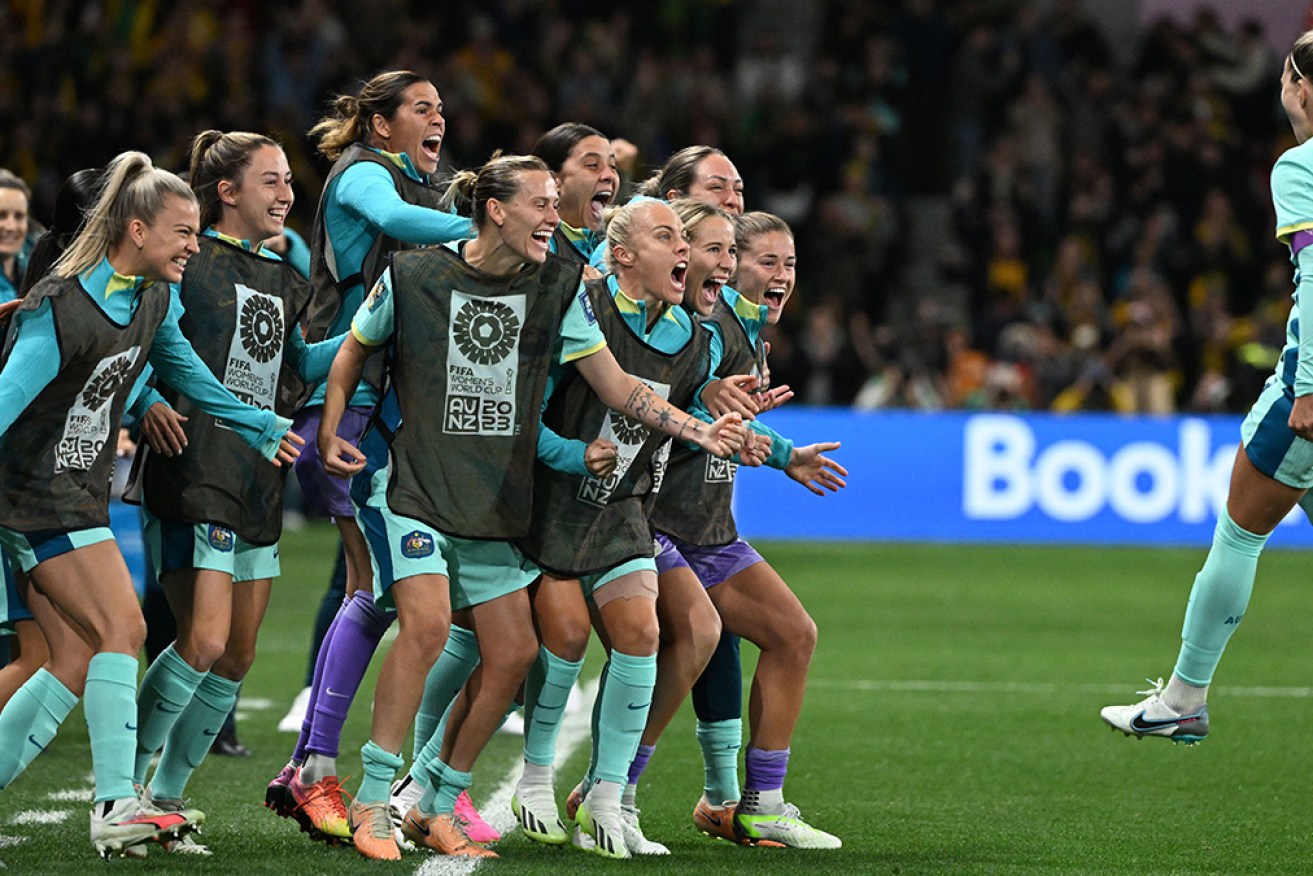Denmark is the next big threat to the Matildas’ #Tilitsdone mission


Steph Catley celebrates with teammates after her penalty against Canada in Melbourne. Photo: AFP/Getty
The eyes of a nation will converge on Sydney on Monday night as the Matildas take on Denmark for a spot in the quarter-finals of the FIFA Women’s World Cup.
Much has been written about the Australian team’s efforts to create a legacy for the next generation of footballers, which for many has already been accomplished, but the on-field quest for glory epitomised by its #Tilit’sdone slogan goes on the line in another must-win match.
The New Daily examines how the Matildas can again rise to the occasion against the formidable opponents as the world game commands attention like never before.
#Til It’s Done
If we’ve learned anything from the group stages of the thrilling FIFA Women’s World Cup, it is to expect the unexpected.
World No.2 and two-time winner Germany is out. No.8 Brazil is gone. And Olympic champion Canada, ranked seventh, is no longer vying for honours.

German striker Alexandra Popp rues a missed chance that led to an early exit. Photo: Getty
And their places have been taken by unfancied nations such as Morocco (No.72), South Africa (No.54), Jamaica (No.43) and Colombia (No.25) as crowds in Australia and New Zealand/Aotearoa flock in record numbers to matches across the nine host cities.
The upsets, intrigue and epic tales have surely changed the foundation of women’s sport, upholding the #Beyond Greatness slogan tournament organisers have espoused and fulfilling the prediction that it’s “gonna be massive” echoed by Matildas star Ellie Carpenter beforehand.
Even FIFA president Gianni Infantino has been a fan of the tournament, and that was before the end of the group games.
“Australia and New Zealand] have put on the best Women’s World Cup, ever,” Infantino declared.
The journey so far

Caitlin Foord switching back to the left flank has helped rebalance the Matildas’ structure. Photo: Getty
The Matildas are riding high on confidence after topping the group for the first time at a World Cup.
The 1-0 win against Republic of Ireland in Sydney was largely overshadowed by the absence of skipper Sam Kerr. The unexpected 3-1 loss to Nigeria in Brisbane dampened hopes, before the 4-0 demolition of Olympic champions Canada in Melbourne lifted expectations to fever pitch.
In contrast, the Danes struggled until a 90th-minute Amalie Vangsgaard header gave them a 1-0 win against China in Perth, came back down to earth after a Lauren James wonder strike consigned it to a 1-0 loss against European champions England at the Sydney Football Stadium, before defeating Haiti 2-0 in Perth on Tuesday night.
Historically, the Danes have the edge with two wins in the three major matches played between the nations, including a 5-0 win at the 1995 World Cup, but the Matildas claimed a 3-1 away win at Viborg in October to avenge a 3-2 loss at Horsens in June 2021.
Perhaps more importantly, they have never played in Sydney in front of a partisan home crowd awaiting another chapter in this rollicking adventure.
The great Danes

Denmark captain Pernille Harder lays down the law before the England game in Sydney. Photo: Getty
Denmark is led by striker Pernille Harder, who at 30 has enjoyed a decorated, trophy-laden career at Wolfsburg and Chelsea as one of the best players on the planet.
One of Sam Kerr’s teammates during the London club’s recent dominance, she has since transferred to Bayern Munich for the next part of her footballing journey. But she’ll be keen to stamp her imprimatur as the world No.13 side attempts to end the Matildas’ dream run.
She’ll be partnered up front by Lyon star Signe Bruun, who scored 13 times in eight qualification matches, and US-based Rikke Madsen, who filled in as an injury replacement at Melbourne Victory earlier this year.
Much will depend on who wins the midfield, with Arsenal star Kathrine Moller Kuhl and the diminutive Josefine Hasbo providing formidable opposition.
Likewise, the Danes have an impressive defensive record that will test the Matildas’ creativity.
What’s working
If attack is the best form of defence, the Matildas are playing to their strengths.
Moving Caitlin Foord to to her customary spot on the left wing worked wonders against Canada, as her combinations with Steph Catley – together with Ellie Carpenter’s overlapping runs with Hayley Raso – helped unlock the free-flowing football that is central to the Matildas DNA.

Matildas midfielder Kyra Cooney-Cross keeps her cool under pressure from Canada’s Christine Sinclair. Photo: Getty
The Hammarby midfield duo of Katrina Gorry and Kyra Cooney-Cross, whose performances are reportedly attracting the attention of myriad Women’s Super League clubs, Lyon and Juventus, continue to win the decisive battles in the middle of the park.
Fortunately, Clare Hunt has also helped solidify the defence in partnership with Alanna Kennedy, while goalkeeper Mackenzie Arnold bounced back in style with two outstanding saves in Melbourne.
More significantly, the team’s legendary spirit fostered has surfaced when we most needed it.
“The never-say-die attitude doesn’t just come from this generation of players, it’s been embedded in us from past generations and pioneers of the game that some of us have been extremely lucky to play alongside,” Emily van Egmond said.
“It’s something that we carry very close to our hearts.”
Finally, if and when Sam Kerr is deployed at No.9, she provides the side with the scope to play centrally if needed, with her aerial prowess and game intelligence.
Kerr factor remains high

Australian captain Sam Kerr will be determined to play her part against Denmark.
The ‘will she, won’t she’ charade about Sam Kerr playing continues, with the sight of the Chelsea striker training in pink boots setting alight social media on Thursday.
But all drama aside, the Matildas are a superior, more dynamic side when a fully fit Kerr is on the field.
It’s the Plan A that Gustavsson has relied upon in his planning since he took charge three years ago.
That the Matildas have progressed from the group stage with a Plan B and Plan C speaks volumes for their tenacity, adaptability and shared vision.
Denmark coach Lars Sondergaard is well aware of the threat that a fit Sam Kerr will pose.
“She can score goals. She has a fantastic header. She’s quick … she is perhaps the best striker in the world.”
Pressure? What pressure?
The must-win Canada game in Melbourne on July 31 showed how the nation was willing on the team to greater heights, particularly on TV screens.
Since heralded as the most-watched women’s sports match in Australian history and the Seven Network’s most-watched program in 2023, the match attracted a national broadcast reach of 4.71 million, with the broadcast average audience of 2.42 million and 2.68 million peak viewership.
And that’s before Monday night’s must-win Round-of-16 encounter against Denmark, which is expected to top that mark.
The road ahead

Matildas coach Tony Gustavsson has much to ponder. Photo: AFP/Getty
The knockout stages means very few teams and coaches are ever foolish enough to think about the next round, but the potential quarter-finals holds promise of venturing further.
On Saturday, Spain outclassed Switzerland 5-1, and Japan again demonstrated its white-hot form against Norway in its 3-1 triumph.
On Sunday, The Netherlands ended the fairytale rise of South Africa’s Banyana Banyana with a 2-0 win, while Sweden ended USA’s three-peat attempt in a dramatic penalty shootout.
England will hope to overcome the athleticism of Nigeria in Monday’s early match, while Colombia and Jamaica have the chance to continue on their joyous ways, together with France and Morocco on Tuesday.
If victorious on Monday night, Australia faces the prospect of France/Morocco in a quarter-final in Brisbane on Saturday, and against the winner of England/Nigeria versus Colombia/Jamaica in the semi-final.








